
The grey-breasted prinia or Franklin's prinia is a wren-warbler belonging to the family of small passerine birds found mainly in warmer southern regions of the Old World. This prinia is a resident breeder in the Indian subcontinent, Sri Lanka and southeast Asia. Like other prinias, it often holds the tail upright but it is easily told by a smoky grey band across the breast which contrasts with a white throat. The beak is all black while the legs are pink. The tail is graduated as in other prinias and the grey feathers are tipped in white. In the breeding plumage the upperparts are grey while non-breeding birds are pale above with rufous wings and a weak supercilium. It is found in scrub, forest clearings and other open but well vegetated habitats. It can be confused with the rufescent prinia.

The green peafowl or Indonesian peafowl is a peafowl species native to the tropical forests of Southeast Asia and Indochina. It is the national bird of Myanmar. Formerly common throughout Southeast Asia, only a few isolated populations survive within Cambodia and adjacent areas of Vietnam. It has been listed as endangered on the IUCN Red List since 2009, primarily due to widespread deforestation, agriculture and loss of suitable habitat, severely fragmenting the species' populations and contributing to an overall decline in numbers. Due to their natural beauty, they are still sometimes targeted by the pet trade, feather collectors, and even by hunters for meat. They are a much-desired bird for private and home aviculturists, despite their rather high-maintenance care requirements.

The golden-throated barbet is an Asian barbet native to Southeast Asia, where it inhabits foremost forests between 900 and 2,700 m altitude. It is listed as Least Concern on the IUCN Red List because of its wide distribution and stable population.
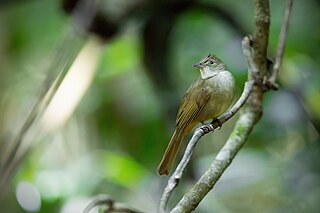
The grey-eyed bulbul is a species of songbird in the bulbul family, Pycnonotidae. It is found in Southeast Asia in its natural habitat of subtropical or tropical moist lowland forests.
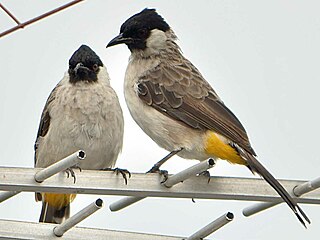
The sooty-headed bulbul is a species of songbird in the Bulbul family, Pycnonotidae. It is found in south-eastern Asia. Its natural habitat is subtropical or tropical moist lowland forests.
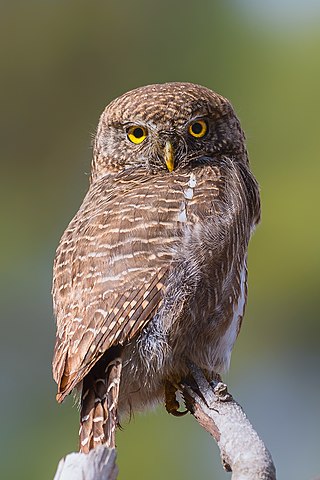
The Asian Barred Owlet also known as the Cuckoo owlet is a species of pygmy owl native to the forests and shrublands of mainland Southeast Asia to the foothills of the Himalayas of northern Pakistan. It is a smaller owl, measuring 22–25 cm (8.7–9.8 in) making it one of the larger pygmy owls. They are primarily insectivorous but will eat lizards, small rodents and birds as well.

The lesser racket-tailed drongo is a species of bird in the family Dicruridae. It is found in the Indian Subcontinent and Southeast Asia.

The spot-breasted laughingthrush is a species of bird in the family Leiothrichidae. It is found in Yunnan, Northeast India, Laos, Myanmar, north-west Thailand, and northern Vietnam. Its natural habitats are subtropical or tropical moist lowland forests and subtropical or tropical moist montane forests.

The rufous-chinned laughingthrush is a bird species in the family Leiothrichidae. It ranges across the northern parts of the Indian subcontinent and some parts of Southeast Asia.

Abbott's babbler is a species of bird in the family Pellorneidae. It is widely distributed along the Himalayas in South Asia and extending into the forests of Southeast Asia. They are short-tailed and stout birds which forage in pairs in dense undergrowth close to the ground and their presence is indicated by their distinctive calls.

The small niltava is a species of bird in the family Muscicapidae, native to the Indian subcontinent and Southeast Asia. It is found in Bangladesh, Bhutan, India, Laos, Myanmar, Nepal, Thailand, Tibet and Vietnam. Its natural habitat is subtropical or tropical moist montane forests.

The rufous-bellied niltava is a species of bird in the family Muscicapidae.

The maroon oriole is a species of bird in the family Oriolidae. It is found in Southeast Asia.

The short-tailed parrotbill is a species of bird in the family Paradoxornithidae. It is found in China, Laos, Myanmar, Thailand, and Vietnam. Its natural habitat is subtropical or tropical moist lowland forests.

The rusty-naped pitta is a species of bird in the family Pittidae.
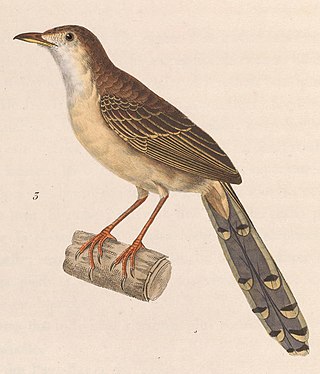
The brown prinia is a species of bird in the family Cisticolidae. The Burmese prinia and the Annam prinia were formerly lumped with this species.
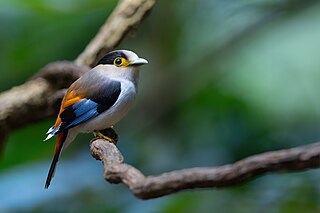
The silver-breasted broadbill is a species of bird in the broadbill family, Eurylaimidae that is found in parts of Southeast Asia. There are seven currently recognised subspecies; the other species in the genus Serilophus, the grey-lored broadbill, was also previously treated as being a subspecies of this species.
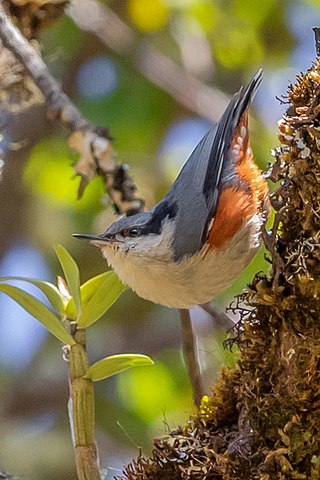
The chestnut-vented nuthatch is a species of bird in the nuthatch family Sittidae. It is a medium-sized nuthatch, measuring 12.5–14 cm (4.9–5.5 in) in length. The upperparts are a solid gray blue, with a markedly black loral stripe. The underparts are uniform gray to buff from the throat to belly, with brick red on the flanks. The undertail is white with a rufous border. The chestnut-vented nuthatch utters different kinds of calls, which can sometimes sound like a troglodyte alarm, and its song is a monotonous, stereotypical crackle, typically chichichichi. Its ecology is poorly known, but it probably feeds on small arthropods and seeds, and the breeding season begins between March and May. The nest is typically located in a hole in the trunk of a tree, and the clutch has two to five eggs.

The grey-throated babbler is a species of passerine bird in the Old World babbler family Timaliidae.

The large woodshrike is found in south-eastern Asia, Sumatra, Java, and Borneo. Its natural habitats are temperate forest, subtropical or tropical moist lowland forest, subtropical or tropical mangrove forest, and subtropical or tropical moist montane forest.





















